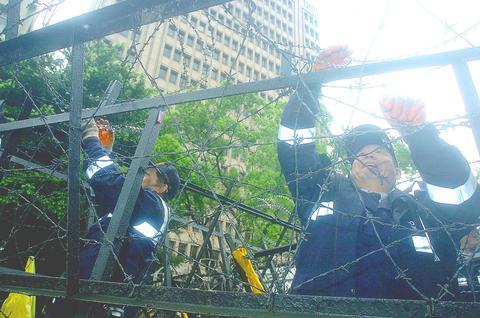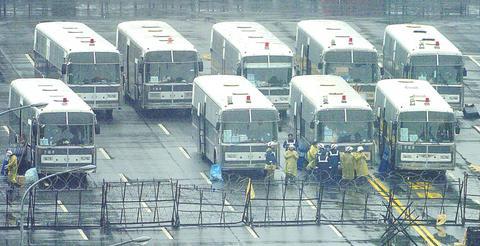Police yesterday said that they had plans in place to deal with any potential mobster or spy activities at the demonstration in front of the Presidential Office.
"We received reliable tips that local gangsters may be involved in the rally, so we have to pay attention to that and take all necessary precautionary measures," said Wang Cho-chiun (

PHOTO: LIAO CHEN-HUI, TAIPEI TIMES
Yu Yi-hsien (

PHOTO: CHANG CHIA-MING, TAIPEI TIMES
The informant told the police that many pan-blue camp officials had recognized gangsters in the crowd during the protest at the Central Election Committee on Friday. The gangsters were allegedly planning to create trouble at yesterday's rally.
"We are still trying to confirm the tips and trying to figure out whether these gangsters were paid to participate," Yu said. "If so, who is their employer?"
Another source told police that China may send spies to inflame people's emotions by creating minor incidents during the rally.
"We have not been able to substantiate any of the claims about espionage. Our investigation did not reveal any sign that Chinese spies are involved," Yu said.
In an incident at the People First Party (PFP) headquarters on Friday, two rioters lit a petrol bomb made from a beer bottle in front of the building, then dropped the bottle and ran away. The flames were extinguished by PFP officials.
The police administration's First Peace Preservation Corp yesterday sent 200 officers to guard the Democratic Progressive Party's headquarters. Two officers and a police vehicle patrolling the area every hour were assigned to the PFP headquarters.
As of press time yesterday, no injuries or gangster activity had been reported at the protest at the Presidential Office.
The police did arrest two teenagers who brought samurai swords into the crowd. The teenagers were being questioned by authorities last night.
According to Yu, the Taipei City Police Department assigned 4,600 officers to maintain public order at the rally. The National Police Administration assigned another 4,000 officers to help.
"Everything will be under control, if the crowd stays calm," Yu said.

An essay competition jointly organized by a local writing society and a publisher affiliated with the Chinese Communist Party (CCP) might have contravened the Act Governing Relations Between the People of the Taiwan Area and the Mainland Area (臺灣地區與大陸地區人民關係條例), the Mainland Affairs Council (MAC) said on Thursday. “In this case, the partner organization is clearly an agency under the CCP’s Fujian Provincial Committee,” MAC Deputy Minister and spokesperson Liang Wen-chieh (梁文傑) said at a news briefing in Taipei. “It also involves bringing Taiwanese students to China with all-expenses-paid arrangements to attend award ceremonies and camps,” Liang said. Those two “characteristics” are typically sufficient

A magnitude 5.9 earthquake that struck about 33km off the coast of Hualien City was the "main shock" in a series of quakes in the area, with aftershocks expected over the next three days, the Central Weather Administration (CWA) said yesterday. Prior to the magnitude 5.9 quake shaking most of Taiwan at 6:53pm yesterday, six other earthquakes stronger than a magnitude of 4, starting with a magnitude 5.5 quake at 6:09pm, occurred in the area. CWA Seismological Center Director Wu Chien-fu (吳健富) confirmed that the quakes were all part of the same series and that the magnitude 5.5 temblor was

The Central Weather Administration has issued a heat alert for southeastern Taiwan, warning of temperatures as high as 36°C today, while alerting some coastal areas of strong winds later in the day. Kaohsiung’s Neimen District (內門) and Pingtung County’s Neipu Township (內埔) are under an orange heat alert, which warns of temperatures as high as 36°C for three consecutive days, the CWA said, citing southwest winds. The heat would also extend to Tainan’s Nansi (楠西) and Yujing (玉井) districts, as well as Pingtung’s Gaoshu (高樹), Yanpu (鹽埔) and Majia (瑪家) townships, it said, forecasting highs of up to 36°C in those areas

The brilliant blue waters, thick foliage and bucolic atmosphere on this seemingly idyllic archipelago deep in the Pacific Ocean belie the key role it now plays in a titanic geopolitical struggle. Palau is again on the front line as China, and the US and its allies prepare their forces in an intensifying contest for control over the Asia-Pacific region. The democratic nation of just 17,000 people hosts US-controlled airstrips and soon-to-be-completed radar installations that the US military describes as “critical” to monitoring vast swathes of water and airspace. It is also a key piece of the second island chain, a string of